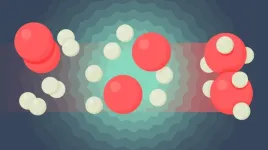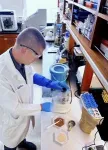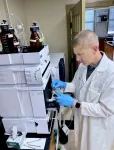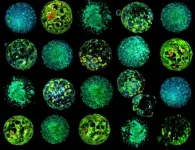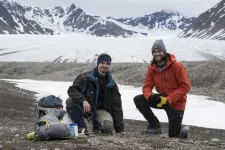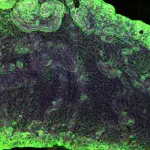(Press-News.org) The Simons Foundation’s Flatiron Institute has launched a new initiative focused on advancing the science of catalysis. The Initiative for Computational Catalysis (ICC), which began operations on July 1, will harness computational techniques to study and design substances called catalysts that speed up chemical reactions. Such substances promise to be instrumental in clean energy generation and in reducing greenhouse gas emissions from industrial processes.
“These are big questions that are hard to address from the very first step of the process through to the end,” says Angel Rubio, who will lead the initiative alongside fellow co-director Timothy Berkelbach. “But at the ICC, we will have a whole chain of researchers with complementary expertise that can handle all topics of a multiscale catalysis question.”
The ICC’s ultimate goal is to develop more efficient and affordable catalysts. The presence of a catalyst accelerates chemical reactions without the catalyst itself being consumed. For instance, the catalytic converter in a gas-powered car’s exhaust system converts hazardous combustion byproducts into relatively less harmful substances like water vapor and carbon dioxide. Around 90 percent of chemical manufacturing by volume relies on catalysts, including the production of vital chemicals such as fertilizers, pharmaceuticals and vitamin supplements.
Designing new catalysts is tricky, though, as the chemistry involved can be incredibly complex. Initiative scientists will study a range of catalysts using tools from machine learning, molecular dynamics and electronic structure research. ICC scientists will also collaborate with fellow Flatiron Institute researchers and external experimental partner groups to enable new advances in the field.
“Catalysts are essential to our food supply and much of daily life,” says Simons Foundation president David Spergel. “If the ICC can significantly advance our ability to produce novel catalytic materials, it could have a profound long-term impact on our environment and our food supply. The ICC is a high-risk, high-reward project.”
The ICC is the first undertaking in the Flatiron Institute’s new initiative program, which aims to support research teams focusing on important topics by providing resources and a dedicated space over a 10-year period. The ICC is starting with an eight-person team but will eventually grow to a group of around 25, which will include senior scientists, postdoctoral researchers, guest researchers, software engineers and other personnel.
“Putting all of those people under the same roof with roughly the same goals of specific catalytic reactions is extremely rare,” Rubio says.
The relatively large head count will allow the group to comprehensively understand issues in catalysis, Rubio says. The scientists will investigate how individual electrons behave over femtoseconds (millionths of billionths of seconds) and how large collections of atoms behave over timescales billions of times longer.
Tackling such a range of scales is a long-standing challenge, but thankfully, the field is finally reaching a tipping point with advancements in computational models and computing powers, Rubio says. Fundamental computational models and tools in the field are just becoming ready to be applied to highly complex problems — which most in catalysis are. Additionally, catalysis research is more essential than ever for developing new solutions to climate change.
“A lot of the processes that will move us into a renewable-energy economy are going to be facilitated through catalysis,” Berkelbach says.
For example, hydrogen is a promising clean fuel and a key ingredient in synthesizing the nearly 200 million metric tons of ammonia used annually for fertilizer. However, most of this hydrogen is produced using natural gas, creating immense quantities of carbon dioxide in the process. There is an alternative, though. A process known as water splitting can produce hydrogen from water without the carbon byproduct, but it’s too costly to be widely used in commercial settings.
“Catalysts are known to facilitate this process of water splitting,” Berkelbach says. “But there’s a lot of basic research that needs to be done to understand how we can design catalysts that are more efficient, more affordable to manufacture, and longer-lasting — all the things that would actually make it economically viable.”
The ICC will integrate with the five Flatiron Institute centers, including the Center for Computational Quantum Physics (CCQ), the Center for Computational Biology (CCB) and the Center for Computational Mathematics (CCM), which will also benefit from the collaboration.
“In addition to having access to the people and resources at the Flatiron Institute, one novelty of our initiative is, we will also be able to engage in experimental activities through collaborations with other top-level institutions,” Rubio says.
The ICC is also looking to develop key tools that the whole catalysis community can use. “We want to generate software that would empower the whole community to be more influential in the ability to study catalysis,” Berkelbach says. “We want to create the tools that don’t already exist and which could change the accuracy and speed with which we make predictions.”
The ICC will draw on the experience and expertise Rubio and Berkelbach have gained over their careers, including their time at the CCQ. In addition to being a distinguished research scientist at the CCQ, Rubio is the managing director of the Max Planck Institute for the Structure and Dynamics of Matter and the director of its theory department, a distinguished professor of physics at the University of the Basque Country, and a professor of physics at the University of Hamburg. He is one of the founders of the European Theoretical Spectroscopy Facility and the originator of the widely used ab initio open-source project Octopus. He is a member of the U.S. National Academy of Sciences, the German Leopoldina Academy and the Chinese Academy of Sciences.
Berkelbach was a research scientist at the CCQ from 2019 to 2022. He is also an associate professor in the department of chemistry at Columbia University and a recipient of the American Chemical Society’s National Fresenius Award, the National Science Foundation’s CAREER award, the Department of Energy’s Early Career Award, and the Presidential Early Career Award for Scientists and Engineers.
ABOUT THE FLATIRON INSTITUTE
The Flatiron Institute is the research division of the Simons Foundation. The institute's mission is to advance scientific research through computational methods, including data analysis, theory, modeling and simulation.
END
Flatiron Institute launches initiative for computational catalysis
The new initiative will investigate substances called catalysts that accelerate chemical reactions. The development of new catalysts could help generate clean energy and reduce the environmental impact of industrial processes.
2024-07-01
ELSE PRESS RELEASES FROM THIS DATE:
NRL intern discovers a new pulsar buried in a mountain of data
2024-07-01
WASHINGTON – U.S. Naval Research Laboratory (NRL) Remote Sensing Division intern, Amaris McCarver, along with a team of astronomers, discovered the first millisecond pulsar in the stellar cluster Glimpse-CO1 and recently published findings in the Astrophysical Journal.
Pulsars are natural laboratories for studying the behavior of matter under extreme gravitational and magnetic fields - conditions difficult or impossible to replicate on Earth.
They also function as natural timekeepers. Precise timing of the observed pulses from an array of pulsars offers a means to ...
Farm-to-table study reveals why whole grains are healthiest
2024-07-01
Chicago (July 1, 2024) — What does whole wheat have that refined flour lacks? A new study reveals key differences in nutrient content along with exactly where nutrients are lost — and sometimes gained — along the journey from farm to table.
While previous studies have assessed the nutrients contained in various crops or in food products, the new study is among the first to bridge the two by tracing how processing and baking influence nutrient composition at each step.
Researchers report that levels of major minerals were cut by nearly three-quarters ...
Revolutionary technology promises to reduce the time to pregnancy in assisted reproduction
2024-07-01
A new technology developed by the "Bioengineering in Reproductive Health" team at the Institute for Bioengineering of Catalonia (IBEC) is able to visualise the metabolism of embryos obtained through in vitro fertilisation in order to decide which are most likely to implant correctly in the uterus and reaching full-term. It is a more accurate and reliable technique than traditional methods.
The revolutionary method, called METAPHOR", generates 3D images that reveal the colours present in the embryo in a completely non-invasive way. Certain naturally fluorescent compounds in the embryo's metabolism are also key to processes such as cellular respiration ...
Shrinking glaciers: Microscopic fungi enhance soil carbon storage in new landscapes created by shrinking Arctic glaciers
2024-07-01
Melting Arctic glaciers are in rapid recession, and microscopic organisms colonise the newly exposed landscapes. Dr. James Bradley, Honorary Reader in Arctic Biogeochemistry in the School of Biological and Behavioural Sciences at Queen Mary University of London, and his team, have revealed that yeasts play an important role in soil formation in the Arctic after glaciers have melted away.
Roughly 10% of Earth’s land surface is covered by glacial ice. However, glaciers are retreating ever further and ever faster because of global warming. As they do, ...
UMD-led study finds one-third of Indonesia’s deforested land left idle
2024-07-01
EMBARGOED UNTIL JULY 1, 2024 AT 3:00 PM U.S. EASTERN TIME
According to a new study published in the Proceedings of the National Academy of Sciences, extensive land areas have been left sitting idle after tropical forests were cleared in Indonesia, a country renowned for its biodiverse rainforests and carbon-rich peatlands. Since 1990, the country has lost 25% of its old-growth forest, and while over one-quarter (7.8 million hectares) of Indonesia’s deforested lands have been converted to palm oil plantations since ...
University of Cincinnati study: Overlooked brain organ plays key role in promoting brain repair after stroke
2024-07-01
University of Cincinnati researchers have pioneered an animal model that sheds light on the role an understudied organ in the brain has in repairing damage caused by stroke.
The research, published July 5 in the Proceedings of the National Academy of Sciences, sought to learn more about how the adult brain generates new neurons to repair damaged tissue.
The research team focused on the choroid plexus, a small organ within brain ventricles that produces the brain’s cerebrospinal fluid (CSF). CSF circulates throughout the brain, carrying signaling molecules and other factors thought to be important for maintaining brain function. However, prior to this study, little ...
Harvard researchers find that gratitude is a useful emotional tool in reducing desire to smoke
2024-07-01
Smoking continues to rank as the foremost preventable cause of premature death. In a paper published this week in the Proceedings of the National Academy of Science (PNAS), Harvard researchers report findings that evoking feelings of gratitude in people who smoke helps reduce their urge to smoke, and increases their likelihood of enrollment in a smoking cessation program. They note that these findings could inform newer approaches to public health messaging campaigns that aim to reduce so-called “appetitive” risk behaviors like smoking, drinking, and drug use.
The research team built on the Appraisal Tendency Framework, a theoretical model of emotiona and decision making, ...
Researchers disclose the effect of social media use on the mental health of college students during the pandemic
2024-07-01
The COVID-19 pandemic had an unprecedented effect on college students’ mental health: symptoms like anxiety and major depression in young adults ages 18-25 increased significantly compared to before the pandemic.
A new study from researchers at the University of North Carolina at Chapel Hill looks at a possible contributing factor to the worsening trends in mental health: social media.
We know that college students and adolescents are using social media more. Last May, the US Surgeon General issued an advisory on social media and youth mental ...
July Issues of APA Journals cover new research on pharmacogenomics, ADHD medication use, associations between mental health and cardiometabolic complications later in life, and more
2024-07-01
WASHINGTON, D.C., July 1, 2024 — The latest issues of four American Psychiatric Association journals, The American Journal of Psychiatry, Psychiatric Services, American Journal of Psychotherapy and Psychiatric Research and Clinical Practice are now available online.
The July issue of The American Journal of Psychiatry brings together research on affective disorders, pharmacogenomics, and psychiatric illness-related cardiometabolic problems. Highlights include:
• Genome-Wide Association Study of Treatment-Resistant Depression: Shared Biology With Metabolic Traits.
• Pharmacogenomic Clinical ...
Most climate-vulnerable countries with highest hunger rates significantly under-represented in agrifood research
2024-07-01
The most climate-vulnerable countries with the highest hunger rates are significantly under-represented in agrifood research – sparking a need for urgent action and increased investments to redress this imbalance, a major new study has found.
The ‘State of the Field for Research on Agrifood Systems’ report, published by The Juno Evidence Alliance – a partnership of CABI, Havos.Ai and the University of Notre Dame, USA – found that only one out of eight research papers is led by scientists from ...
LAST 30 PRESS RELEASES:
Chimps’ love for crystals could help us understand our own ancestors’ fascination with these stones
Vaginal estrogen therapy not linked to cancer recurrence in survivors of endometrial cancer
How estrogen helps protect women from high blood pressure
Breaking the efficiency barrier: Researchers propose multi-stage solar system to harness the full spectrum
A new name, a new beginning: Building a green energy future together
From algorithms to atoms: How artificial intelligence is accelerating the discovery of next-generation energy materials
Loneliness linked to fear of embarrassment: teen research
New MOH–NUS Fellowship launched to strengthen everyday ethics in Singapore’s healthcare sector
Sungkyunkwan University researchers develop next-generation transparent electrode without rare metal indium
What's going on inside quantum computers?: New method simplifies process tomography
This ancient plant-eater had a twisted jaw and sideways-facing teeth
Jackdaw chicks listen to adults to learn about predators
Toxic algal bloom has taken a heavy toll on mental health
Beyond silicon: SKKU team presents Indium Selenide roadmap for ultra-low-power AI and quantum computing
Sugar comforts newborn babies during painful procedures
Pollen exposure linked to poorer exam results taken at the end of secondary school
7 hours 18 mins may be optimal sleep length for avoiding type 2 diabetes precursor
Around 6 deaths a year linked to clubbing in the UK
Children’s development set back years by Covid lockdowns, study reveals
Four decades of data give unique insight into the Sun’s inner life
Urban trees can absorb more CO₂ than cars emit during summer
Fund for Science and Technology awards $15 million to Scripps Oceanography
New NIH grant advances Lupus protein research
New farm-scale biochar system could cut agricultural emissions by 75 percent while removing carbon from the atmosphere
From herbal waste to high performance clean water material: Turning traditional medicine residues into powerful biochar
New sulfur-iron biochar shows powerful ability to lock up arsenic and cadmium in contaminated soils
AI-driven chart review accurately identifies potential rare disease trial participants in new study
Paleontologist Stephen Chester and colleagues reveal new clues about early primate evolution
UF research finds a gentler way to treat aggressive gum disease
Strong alcohol policy could reduce cancer in Canada
[Press-News.org] Flatiron Institute launches initiative for computational catalysisThe new initiative will investigate substances called catalysts that accelerate chemical reactions. The development of new catalysts could help generate clean energy and reduce the environmental impact of industrial processes.
